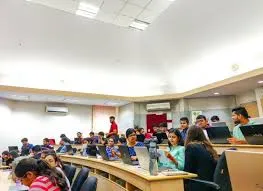About

University Type
Public

Pune,
India

Year Established:
1969
National Institute of Bank Management (NIBM) was established in 1969 by the Reserve Bank of India, in consultation with the Government of India, as an autonomous apex institution for research, training, education and consultancy in bank management. Its mandate is to play a proactive role of “think-tank” of the banking system. NIBM is part of the grand vision of giving a new direction to the banking industry in India and making the industry a more cost-effective instrument for national development. Therefore, helping the managers in their endeavour to make their organizations competitive both in domestic and international markets is the mission of the Institute. NIBM, an autonomous academic institution, is governed by a Board, its highest policy-making body.The Institute is engaged in Research (policy and operations), Training & Education of senior executives of banks, and provides consulting support to the banking and financial sector. As an institution of advanced learning, NIBM is well-equipped to train executives to function in a multi-cultural and multi-national environment.
By providing interdisciplinary modules of theory and practical learning, participants are equipped to become masters in problem-solving.In a year the Institute, on an average, conducts about 150 Training Programmes in various functional areas and also Conferences and Seminars addressing issues of topical concern to the banking and financial services industry. Over 3500 participants, including about 250 from various developing nations attend NIBM training programmes every year.The Institute is located in sylvan surroundings in a picturesque valley within the Pune city in the State of Maharashtra.
The Campus is spread over a 60-acre plot of undulating landscape with minimum of distraction and pollution. It has its own self-contained campus with complete residential and educational facilities.The Post-Graduate Programme in Banking and Finance (PGPBF), introduced in the year 2003-04 to groom new generation managers for the banking and financial services industry, is an additional key identity of the Institute.
National Institute of Bank Management Program Rankings
- Not available - Rank Not available (Not available)
National Institute of Bank Management Highlights
FAQs
What are the most popular graduate programs offered at National Institute of Bank Management?
The National Institute of Bank Management (NIBM) offers specialized graduate programs primarily focused on banking and finance sectors. Popular programs include Post Graduate Diploma in Management (Banking & Financial Services) which equips students with robust managerial skills necessary for the banking industry.
What is the Annual Cost of attendance at National Institute of Bank Management?
The annual tuition fee for programs like the Post Graduate Diploma in Management is approximately INR 12,00,000. Living expenses, including accommodation, food, and other personal expenses, are estimated around INR 2,50,000 per year. Therefore, the total annual cost of attendance is approximately INR 14,50,000.
What Financial aid and scholarship options are available at National Institute of Bank Management?
NIBM offers several scholarships and financial aid options based on merit and financial need. Interested students can apply by submitting the scholarship application form available on the NIBM website alongside their program application. Details regarding eligibility and documentation are also provided on the institute’s official portal.
What is the reputation and ranking of National Institute of Bank Management?
NIBM is highly regarded for its focus on banking and financial services education. While specific global rankings may not be widely published, the institute is recognized in India for its industry-aligned curriculum and strong alumni network, which significantly enhances its reputation in the banking sector.
What is the campus culture like at National Institute of Bank Management?
The campus culture at NIBM is vibrant and engaging. Students can participate in various cultural fests, seminars, and workshops that are regularly organized. The institute also supports several student clubs and societies that focus on everything from sports to finance, providing a holistic environment for personal and professional growth.
What are the housing options at National Institute of Bank Management?
NIBM provides on-campus housing facilities with well-equipped hostels. For those preferring off-campus living, areas such as Kondhwa and Wanowrie offer a variety of housing options ranging from shared apartments to independent flats, catering to different budgets and preferences, and are located conveniently close to the campus.
.webp)
.webp)
.webp)


